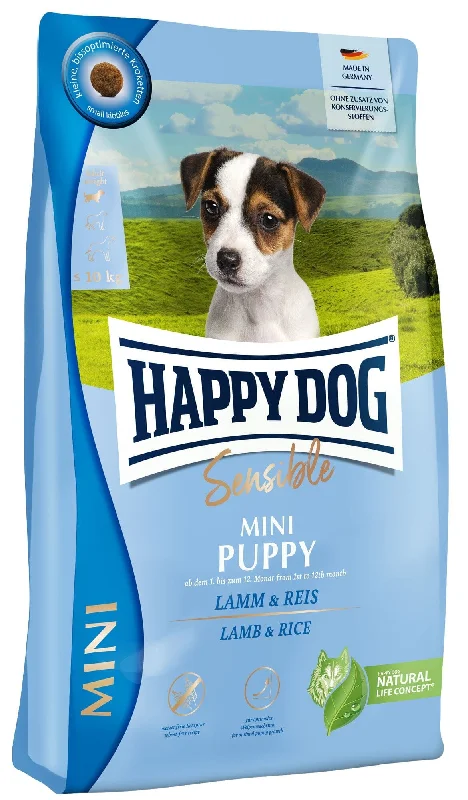Complete food for puppies and young dogs of small breeds from 1 to 12 months
In order to support harmonious growth in puppies and young dogs of small breeds, a balanced diet is particularly important in the first months of life. The composition of the puppy food should have an optimal ratio of fats and proteins. Our Happy Dog Sensible Mini Puppy offers your little dog all the important ingredients in sufficient quantities. This will provide your little dog with everything he needs in the first months of life.
Easily digestible feed with lamb & rice
Well-tolerated lamb and easily digestible rice do not burden your little puppy's digestive tract. The digestible dry food is free from poultry and is ideal for small dogs with sensitive digestion. The addition of mussel extract supports the development of your little dog's bones, tendons, ligaments and joints.
Why is Sensitive Mini Puppy Lamb & Rice good for your little dog?
- poultry-free & wheat-free recipe
- made entirely without additives
- feed that is particularly easy to digest
- balanced whole food strengthens the immune system
At what age can you feed your small dog Sensible Mini Puppy Lamb & Rice?
Ideally, you should feed your little dog Happy Dog Sensible Mini Puppy from the age of 4 weeks up to and including 12 months. Small dog breeds up to 10 kg (weight of the adult dog) mature faster and grow more evenly than large breeds. That's why there are our Mini Puppy products especially for puppies and young dogs of small breeds. From the age of 13 months you can slowly switch to a Mini Adult food. Following Sensible Mini Puppy, we recommend our
Complete feed for puppies and young dogs of small breeds up to 10 kg adult weight. For feeding from the 4th week of life up to and including the 12th month.
Composition:
Lamb protein* (19.5%), rice (19%), corn flour, greaves, oils and fats, corn, rice protein* (5%), hydrolysed protein, beet molasses pulp* (desugared), cellulose, apple pomace*, potassium chloride, yeast* , sodium chloride, seaweed*, linseed, psyllium husk, yucca schidigera*, mussel meat* (0.04%), milk thistle, yeast* (extracted), artichoke, dandelion, ginger, birch leaves, nettle, chamomile, coriander, rosemary, sage, liquorice root , thyme (dry herbs total 0.15%)
Analytical components:
Crude protein 30.0%, crude fat 16.0%, crude fiber 2.5%, crude ash 8.5%, calcium 1.45%, phosphorus 1.05%, sodium 0.5%, omega-6 fatty acids 2.0 %, omega-3 fatty acids 0.2% additives
Vitamins/kg: vitamin A (3a672a) 17000 IU, vitamin D3 (3a671) 900 IU, vitamin E (as 3a700) 120 mg, vitamin C (as 3a312) 30 mg
Trace elements/kg: iron (as 3b103) 65 mg, copper (as 3b405) 14 mg, zinc (as 3b603, 3b606) 125 mg, manganese (as 3b502) 30 mg, iodine (calcium iodate, anhydrous 3b202) 2.5 mg, Selenium (Sodium Selenite 3b801) 0.2 mg
Amino acids/kg: L-tryptophan (3c440) 1000 mg Antioxidants, tocopherol extracts from vegetable oils 1b306(i)
|
Amount of food (g/24h) for puppies of the appropriate age (LW = week of life) |
||||||||
| final weight* |
4. LW |
6. LW |
8. LW |
10. LW |
12. LW |
16th LW |
21. LW |
7th-12th Month |
| 2kg | 20g _ | 27g _ | 33g | 38g | 42g | 50g | 53g | 55g |
| 3kg _ | 25g _ | 35g _ | 45g | 50g | 55g | 65g | 70g | 75g |
| 4kg _ | 32g _ | 45g _ | 55g | 65g | 70g | 85g | 90g | 90g |
| 5kg _ | 38g _ | 53g _ | 65g | 75g | 85g | 100 g | 105g | 110g |
| 6kg _ | 43g _ | 60g _ | 75g | 85g | 95g | 110g | 120g | 125g |
| 8kg _ | 55g _ | 75g _ | 90g | 105g | 120g | 140g | 150g | 155g |
| 10kg _ | 65g _ | 85g _ | 105g | 125g | 140g | 160g | 180g | 180g |
*Final weight reached: gradually switch to a suitable adult food.
Hints
- The amount of food should be gradually adjusted every 2-3 days to weekly until the recommended feeding amount for the following age group is reached.
- As the final weight is reached, the energy requirement decreases and the amount of food must be adjusted according to the feeding recommendation.
- Make sure to switch to a suitable adult food when it reaches its final weight.
General feeding instructions
- Weigh puppies regularly and document weight development.
- The information is a guide. Needs vary by age, breed, attitude, and activity level. It may therefore be necessary to adjust the feeding quantity on an individual basis.
- Do not feed too much - pay attention to medium growth.
- When adding snacks, the amount of food should be reduced accordingly. Tip: use part of the daily feed ration as a snack substitute.
- Give the food dry or pour water (approx. 60°C) over it and let it soak in for a few minutes.
- Divide the daily feed ration into several meals (3-4).
- Keep fresh drinking water available at all times.

